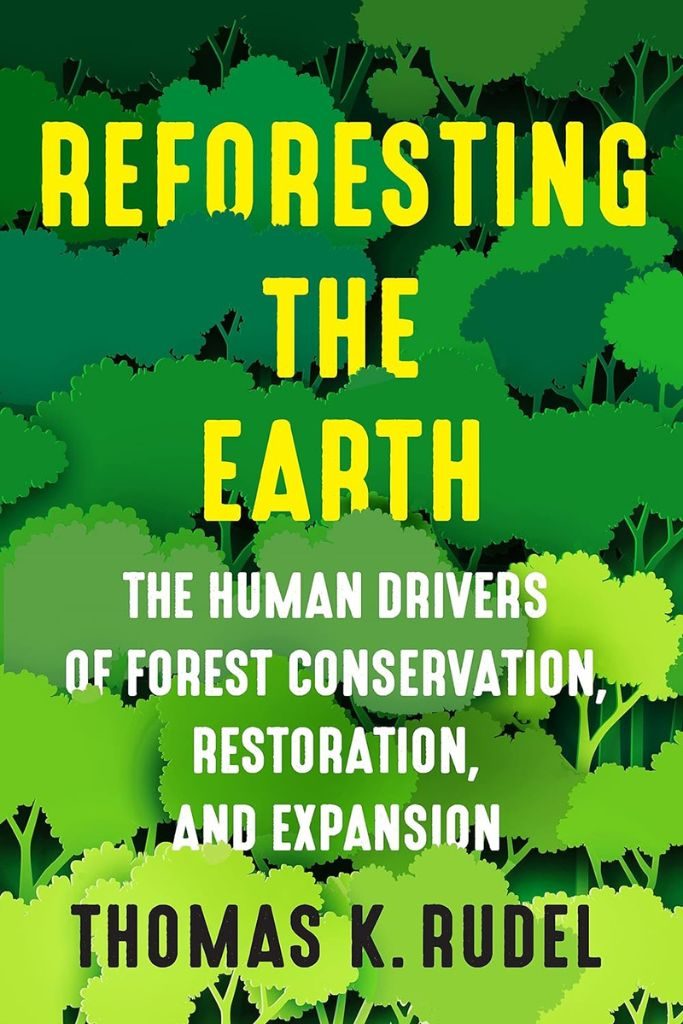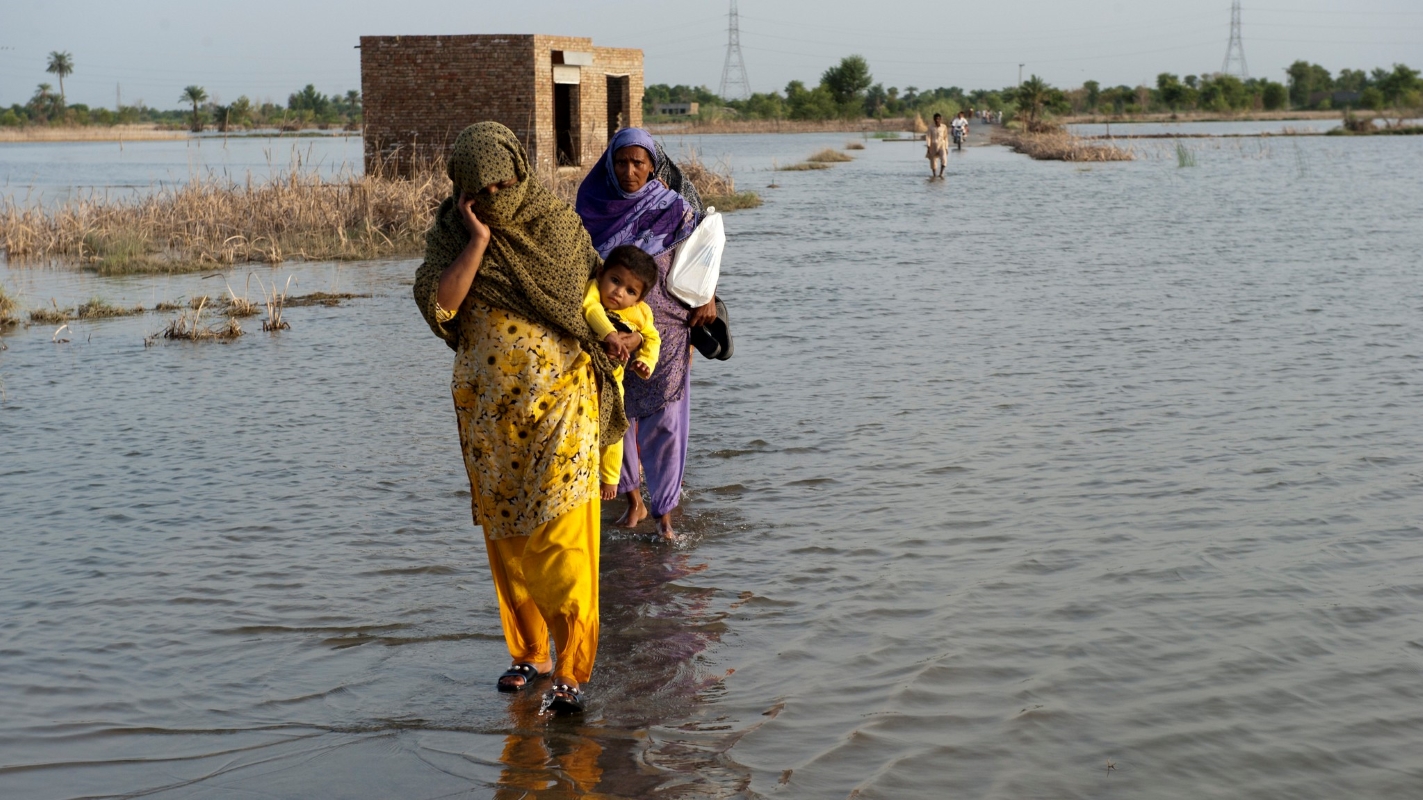In Reforesting the Earth, Thomas K Rudel draws on historical research and case studies to examine the drivers of deforestation and proposes reforestation as an urgent natural solution to the climate crisis. The book advocates for socio-political corporatist processes and local participation to enable successful forest conservation and expansion, offering useful insights for environmentalists, policymakers and activists, writes Mohd Amin Khan.
 The global climate crisis poses a serious threat to the earth’s ecosystem – its biodiversity, forests, soil fertility, water quality, and atmospheric carbon concentration. The impact on nature in turn has adverse effects on the socio-economic, cultural wellbeing and health of people across the globe, with a markedly unequal distribution of these negative effects on nations and communities. In his latest book, Thomas K Rudel emphasises the need for reforestation as a natural solution to the problems of climate change.
The global climate crisis poses a serious threat to the earth’s ecosystem – its biodiversity, forests, soil fertility, water quality, and atmospheric carbon concentration. The impact on nature in turn has adverse effects on the socio-economic, cultural wellbeing and health of people across the globe, with a markedly unequal distribution of these negative effects on nations and communities. In his latest book, Thomas K Rudel emphasises the need for reforestation as a natural solution to the problems of climate change.
Reforesting the Earth aims to investigate the drivers of forest destruction and the factors influencing reforestation and the expansion of forests. It seeks to comprehend the role of human activity, including socio-political corporatist processes – policies based on the inclusive decision-making and governance of an organisation relating to other stakeholders like politicians, activists, donors, farmers, foresters, indigenous groups, and landowners – in reforestation by applying an integrated, case studies-based global data analysis. The ambition is to contribute to global climate crisis alleviation through natural solutions. The book unfolds over nine chapters, four of which discuss the historical background, concepts, theories, and analysis and the other five of which cover 19 cases studies of forest gain or loss worldwide.
The author begins with historical perspectives on the current political system: the actions and events that have precipitated the climate crisis. He then considers what would be the best approach to mitigate the adverse impacts of the crisis. He grounds his argument by elucidating the ways of living of traditional societies that evinced a respectful rather than an extractive relationship with nature. After the age of scientific discovery and innovation in Europe and the industrial revolution (roughly from the late 16th century to the 18th century), the exploitation of nature became an essential aspect of modernity, paving the way to commercialism and a capitalistic society. This shift involved major transformation in terms of socio-economic and political orders and commercial activity, resulting in rapid urbanisation, agricultural expansion, industrialisation, mass migration, population growth and mass deforestation.
This shift [to modernity] involved major transformation in terms of socio-economic and political orders and commercial activity, resulting in rapid urbanisation, agricultural expansion, industrialisation, mass migration, population growth and mass deforestation.
The great economic movement in the 20th century had corresponding environmental consequences: mass deforestation, land degradation, water and air pollution, carbon emissions, biodiversity loss, and depletion of natural resources. By the 1980s, this mass destruction of forest and other natural resources began to mobilise different stakeholders in support of forest conservation.
Rudell states that when collective action has occurred, it has most frequently taken a corporatist form, at both state and societal levels. Corporatist processes involve multiple parties from different strata of society (international investors to local politicians and farmers, indigenous people, environmental activists) coming together to discuss increasing forest cover in different locations. In these discussions, the involved parties agree to compacts where some transfer funds in exchange for others’ commitment to conserving and restoring forests. The parties collaborate on these activities, holding repeated meetings throughout the process. They work together to develop and implement successive plans for forest conservation, restoration, and expansion. Through these collaborative efforts, a corporatist polity emerges. When successful, this integration of diverse groups within the forest-agriculture sector leads to an increase in forest cover and carbon sequestration. Initiatives like the Bonn Challenge and the New York Declaration are the result of collective corporatist actions in which have achieved substantial increments in forest cover and carbon sequestration over time: “REDD+ agreements promote natural climate solutions by exerting direct control over land uses in defined territories. Eco-certification schemes promote natural climate solutions by indirect means” (31).
As local participation, active monitoring, and good governance have a positive association with forest resurgence, weakening these factors can lead to forest loss.
Rudell extends his discussion on the role of societal corporatist processes by analysing 19 diverse case studies worldwide. This involves considering the major five themes within forest conservation and reforestation: avoided deforestation (Ecuadorian Andes Amazon), secondary forest expansions (New England and New Deal South in the USA, Northwest Portugal, and Northern Costa Rica), forest plantation (Congo, China, Laos, Vietnam, Indonesia, Chile, and the USA), agroforestry-based farming (rubber, cocoa, coffee, and domestic forests), and silvopastoral practices (Upper-Lower Amazon and Nigerian Sahel). Among these 19 case studies, 12 witnessed forest gain.
The spatial distribution of the case studies reflects concerns about rapid deforestation in the Global South (due to the shifting of production firms in the Global South by Northern nations, as explained in Laurie Parsons’s Carbon Colonialism). Across the case studies, all major changes in forest cover occurred during the 20th and 21st centuries, which suggests that this change is the output of recent economic expansion.
Seven of the case studies Rudel examines recorded explicit forest loss. These losses occurred in forest plantations in Congo, Indonesia, Southeast USA, silvopastoral practices in the Lower Amazon region, and the agroforestry-based farming of rubber and cocoa in all seven. These seven case studies recorded forest loss, which can be explained by a lack of local participation in conservation programs, monitoring, and reporting, combined with weak governance resulting in corruption. As local participation, active monitoring, and good governance have a positive association with forest resurgence, weakening these factors can lead to forest loss: “Forest cover has increased in places with societal and state corporatism. It has not increased in places where states and governance have been weak or where crucial actors such as state officials or local landholders have not become participants in sectoral agreements to preserve or restore forests” (185).
Rudel advocates for the improved surveillance of forests through remote sensing, providing land rights to indigenous and local communities, eco-certification, encouraging a polycentric approach in governance, and institutionalising landscape changes and social movements of conservation to ensure reforestation projects succeed.
In conclusion, Rudel suggests that the climate crisis can be mitigated through reforestation and forest expansion with the effective engagement of socio-political corporatist arrangements. This is only possible through strong participation in forest conservation programmes and initiatives led by local and indigenous communities, environmental activities, local political parties, and both national and international non-governmental organisations. Furthermore, Rudel encourages normative changes such as reducing the demand and consumption of forest products and consequently forest losses. Similarly, declining beef consumption, seen notably in the US from 84 to 58 pounds per capita (1970-2020), holds promise for reforesting old cattle pastures. If this trend spreads globally, driven by increasing vegetarian identification in countries like India, China and the US, cattle ranchers may convert some pastures to forests. This reflects the successful reforestation observed in Costa Rica during the 1990s).
He advocates for the improved surveillance of forests through remote sensing, providing land rights to indigenous and local communities, eco-certification, encouraging a polycentric approach in governance, and institutionalising landscape changes and social movements of conservation to ensure reforestation projects succeed. The book is a valuable resource for a broad spectrum of readers, including environmentalists, climate activists, conservationists, sociologists, geographers, economists, and policymakers, as well as anyone interested in understanding and contributing to natural climate solutions to address the ongoing global climate crisis.
Acknowledgement: I am thankful to Monika and Anna D’Alton for reviewing the final draft of the book review and providing valuable suggestions and feedback which notably increases the readability of the book review.
This post gives the views of the author, and not the position of the LSE Review of Books blog, or of the London School of Economics and Political Science.
Image Credit: SOMRERK WITTHAYANANT on Shutterstock.







